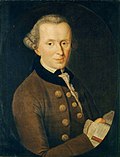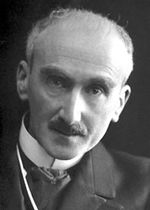Immanuel Kant (born Emanuel Kant; 22 April 1724 – 12 February 1804) was a German philosopher and one of the central Enlightenment thinkers. Born in Königsberg...
153 KB (18,702 words) - 14:08, 28 May 2024
Kantian ethics (redirect from Kant Ethics)
refers to a deontological ethical theory developed by German philosopher Immanuel Kant that is based on the notion that "I ought never to act except in such...
70 KB (9,599 words) - 23:51, 27 May 2024
philosophy of Immanuel Kant (1724–1804) favoured a classical republican approach. In Perpetual Peace: A Philosophical Sketch (1795), Kant listed several...
8 KB (1,008 words) - 20:39, 29 February 2024
Kantianism (redirect from Philosophy of Kant)
Kantianism (German: Kantianismus) is the philosophy of Immanuel Kant, a German philosopher born in Königsberg, Prussia (now Kaliningrad, Russia). The...
9 KB (962 words) - 01:39, 30 December 2023
A priori and a posteriori (section Immanuel Kant)
evidence. Both terms appear in Euclid's Elements and were popularized by Immanuel Kant's Critique of Pure Reason, an influential work in the history of philosophy...
27 KB (2,904 words) - 15:46, 28 February 2024
a philosophical system founded by German philosopher Immanuel Kant in the 18th century. Kant's epistemological program is found throughout his Critique...
24 KB (3,036 words) - 11:45, 9 April 2024
Copernican Revolution (redirect from Kant's Copernican revolution)
Andrew Motte Translation Ermanno Bencivenga (1987), Kant's Copernican Revolution. Immanuel Kant (1929) [1787]. "Preface". Critique of Pure Reason. Translated...
31 KB (3,768 words) - 20:55, 12 May 2024
Critique of the Kantian philosophy (redirect from Arthur Schopenhauer's criticism of Immanuel Kant's schemata)
World as Will and Representation (1818). He wanted to show Immanuel Kant's errors so that Kant's merits would be appreciated and his achievements furthered...
34 KB (5,029 words) - 09:44, 16 October 2023
Rechtsstaat (section Immanuel Kant)
of German philosopher Immanuel Kant (1724–1804) at the beginning of their accounts of the movement toward the Rechtsstaat. Kant did not use the word Rechtsstaat...
14 KB (1,638 words) - 17:15, 20 May 2024
philosophical concept in the deontological moral philosophy of Immanuel Kant. Introduced in Kant's 1785 Groundwork of the Metaphysics of Morals, it is a way...
38 KB (5,636 words) - 03:39, 16 May 2024
Immanuel Kant Baltic Federal University (IKBFU; Russian: Балтийский федеральный университет имени Иммануила Канта) is a public research university located...
7 KB (730 words) - 15:12, 30 May 2024
In Immanuel Kant's philosophy, a category (German: Categorie in the original or Kategorie in modern German) is a pure concept of the understanding (Verstand)...
9 KB (1,036 words) - 11:01, 27 November 2023
Sublime (philosophy) (section Immanuel Kant)
Theory. Carbondale, IL, 1957. Kant, Immanuel. Critique of Judgment. Trans. J.H. Bernard. Macmillan, 1951. Kant, Immanuel. Observations on the Feeling of...
31 KB (4,195 words) - 19:41, 2 May 2024
German idealism (section Kant)
late 18th and early 19th centuries. It developed out of the work of Immanuel Kant in the 1780s and 1790s, and was closely linked both with Romanticism...
18 KB (2,245 words) - 01:19, 23 February 2024
Soul (section Immanuel Kant)
sensitive soul incorruptible. In his discussions of rational psychology, Immanuel Kant (1724–1804) identified the soul as the "I" in the strictest sense, and...
100 KB (11,978 words) - 12:25, 31 May 2024
Arthur Schopenhauer (section Immanuel Kant)
irrational noumenal will. Building on the transcendental idealism of Immanuel Kant (1724–1804), Schopenhauer developed an atheistic metaphysical and ethical...
152 KB (19,822 words) - 00:17, 18 May 2024
A Philosophical Enquiry into the Origin of Our Ideas of the Sublime and Beautiful (section Kant's comments)
attracted the attention of prominent thinkers such as Denis Diderot and Immanuel Kant. According to Burke, the Beautiful is that which is well-formed and...
5 KB (464 words) - 14:11, 25 March 2024
Noumenon (section Criticisms of Kant's noumenon)
to, the term phenomenon, which refers to any object of the senses. Immanuel Kant first developed the notion of the noumenon as part of his transcendental...
25 KB (3,285 words) - 12:36, 20 April 2024
Bracketing (phenomenology) (section Immanuel Kant)
the influential ideas of Immanuel Kant (1724–1804). Attempting to resolve some of the key intellectual debates of his era, Kant argued that Noumena (fundamentally...
8 KB (881 words) - 16:07, 23 May 2024
Ontological argument (section Immanuel Kant)
The traditional definition of an ontological argument was given by Immanuel Kant. He contrasted the ontological argument (literally any argument "concerned...
68 KB (8,842 words) - 19:13, 16 May 2024
Public reason (section Immanuel Kant)
have authority. It is an idea with roots in the work of Thomas Hobbes, Immanuel Kant, and Jean-Jacques Rousseau, and has become increasingly influential...
5 KB (561 words) - 18:52, 10 May 2023
Critique of Pure Reason (redirect from A and B numbering (Kant))
German philosopher Immanuel Kant, in which the author seeks to determine the limits and scope of metaphysics. Also referred to as Kant's "First Critique"...
115 KB (16,134 words) - 06:44, 23 May 2024
Rationalism (section Immanuel Kant (1724–1804))
Gottfried Wilhelm Leibniz Archived 2020-08-05 at the Wayback Machine. "Immanuel Kant (Stanford Encyclopedia of Philosophy)". Plato.stanford.edu. 20 May 2010...
60 KB (6,962 words) - 03:07, 23 May 2024
Inductive reasoning (section Immanuel Kant)
Philosophy and Phenomenological Research, 1953 Sep;14(1):39–48, [39]. Cf. Kant, Immanuel (1787). Critique of Pure Reason. pp. B132. Roberto Torretti, The Philosophy...
65 KB (8,326 words) - 01:52, 6 May 2024
Consciousness. It is used as a defense of free will in a response to Immanuel Kant, who believed free will was only possible outside time and space. Zeno...
11 KB (1,512 words) - 00:37, 21 October 2023
centuries, after Immanuel Kant used it in the essay "Answering the Question: What Is Enlightenment?" (1784). As a philosopher, Kant claimed the phrase...
9 KB (1,233 words) - 15:07, 8 April 2024
philosophical usage through Immanuel Kant, who contrasted it with the noumenon, which cannot be directly observed. Kant was heavily influenced by Gottfried...
6 KB (605 words) - 00:15, 11 April 2024
Absurdism (section Immanuel Kant)
absurdism. An idea very close to the concept of the absurd is due to Immanuel Kant, who distinguishes between phenomena and noumena. This distinction refers...
76 KB (9,938 words) - 15:54, 31 May 2024
revival of the 18th-century philosophy of Immanuel Kant. The neo-Kantians sought to develop and clarify Kant's theories, particularly his concept of the...
13 KB (1,502 words) - 19:39, 6 May 2024














